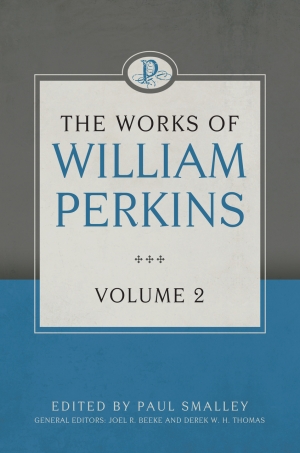Here the true nature of the Remonstrant doctrine of perseverance emerges: God helps those who help themselves by cooperating with his “assisting grace.” This is quite another picture of salvation. Here God has not parted the Red Sea and led us through, by the hand, as it were (Jer 31:32; Ex 14:16). Rather, according to the Remonstrants, God has covenanted to co-act with those who do what lies within them (facientibus quod in se est, Deus non denegat gratiam). Continue reading →
Perkins: Grace Admits No Partner Or Fellow
[The Galatians] joined the works of the law with Christ and his grace in the cause of their justification and salvation. Here it must be observed that they which make a union of grace and works in the cause of justification are . . . Continue reading →
Audio: One Final, Glorious, Sovereign Word
Here is the audio from the morning sermon at Trinity OPC (Novato) from a couple of Lord’s Days ago:
An Important Distinction Between Kinds And Functions Of Conditions
When we use the word “condition,” the first sense that probably comes to mind, in English usage, is the first definition offered by the Oxford English Dictionary: “convention, stipulation, proviso.” There is another sense to the word, however, as it was used . . . Continue reading →
Turretin: Christ Is Our Substitute In Whom Mercy And Justice Meet
XXVII. The grace of God and the merit of Christ are not opposed, but subordinated because they are viewed here in different respects (kat’ allo kai allo): grace in respect of us, both in the giving of the surety and in the . . . Continue reading →
The Synod Of Dort On Election, Conditions Of Salvation, And Fruit (1)
The Reformed churches have endured discussions and disagreements about salvation (justification, sanctification, and deliverance from the wrath to come) before. Beginning in the late 16th century a Reformed minister in Amsterdam began offering significant revisions of the Reformed understanding of Scripture. Early . . . Continue reading →
Canones Synodi Dordrechtanae
JUDICIUM SYNODI NATIONALIS REFORMATARUM ECCLESIARUM BELGICARUM, Habitæ Dordrechti Anno MDCXVIII. et MDCXIX. Cui Plurimi insignes Theologi Reformatarum Ecclesiarum Magnæ Britanniæ Germaniæ, Galliæ, interfuerunt, de Quinque Doctrinæ Capitibus in Ecclesiis Belgicis Controversis: Promulgatum VI. Maii MDCXIX. PRÆFATIO IN NOMINE DOMINI ET SERVATORIS NOSTRI . . . Continue reading →
The 5 Articles Of Remonstrance (1610)
ARTICLE I. That God, by an eternal, unchangeable purpose in Jesus Christ, his Son, before the foundation of the world, hath determined, out of the fallen, sinful race of men, to save in Christ, for Christ’s sake, and through Christ, those who, . . . Continue reading →
Grammar Guerilla: Champing Vs Chomping At The Bit
Language evolves over time and that process is often driven by popular usage. This may be one of those instances where popular usage has so far outstripped the original use of a phrase that it is beyond correcting. Nevertheless I persevere if . . . Continue reading →
Vermigli On The Causal Relations Among Predestination, Vocation, Justification, And Good Works
It is possible if the effects of predestination are considered together with one another, that one may be the cause of another. But they cannot be the causes of the divine purpose. For calling, which is the effect of predestination, is the . . . Continue reading →
Office Hours: What Happened To Reformed Orthodoxy? (2)
In the well-researched and written volume, Calvin Meets Voltaire: The Clergy of Geneva during the Age of Enlightenment, 1685-1798, Eighteenth-Century Studies Series (Ashgate: 2014), Jennifer Powell McNutt argued that there was more continuity, than has sometimes been thought, between 18th-century Genevan theology, piety, . . . Continue reading →
Strangers And Aliens (8): A Rock Of Offense And A Cornerstone (1 Peter 2:7–8)
What Martin Luther (1483–1546) expressed as a distinction between the distinction between a theology of glory (theologia gloriae) and the theology of the cross) the Reformed tended to express as a distinction between the Creator and the creature but same set ideas . . . Continue reading →
Recovering The Reformed Confession For .99 On Kindle Today
In case you’ve been waiting for the best possible deal before getting your own copy of Recovering the Reformed Confession well, the Kindle version is available today for .99. You can also get for $1.99 the Kindle edition of Tributes to John Calvin: A Celebration of . . . Continue reading →
Turretin: We Do Good Works Because We Live By The Gospel
XV. Although we acknowledge the necessity of good works against the Epicureans, we do not on this account confound the law and the gospel and interfere with gratuitous justification by faith alone. Good works are required not for living according to the . . . Continue reading →
Strangers And Aliens (7): The Living Stone And The Living Stones (1 Peter 2:4–6)
There is a strain of modern evangelical theology that looks forward to the literal rebuilding of the Israelite temple and to the re-institution of sacrifices, albeit, in that case, memorial sacrifices. This passage should help us see one of the important reasons . . . Continue reading →
Perkins On Sanctification In Galatians 5:6
The second point is, what is waited for? Paul says the revelation of “righteousness” and eternal salvation. Here I observe that there is no justification by the observation of the law. And I prove it thus. The righteousness whereby a sinner is . . . Continue reading →
New In Print: William Perkins On Galatians
William Perkins (1558–1602) is one of the most important of the English Reformed writers of the late 16th and early 17th centuries and yet he is among the least read in the modern era. One reason for this is because his works . . . Continue reading →
William Perkins On Textual Criticism And The Preservation Of Scripture
Before I come to the consideration of these words, a doubt must be resolved. For some men may say that this is epistle is corrupted because these words are wanting in sundry translations and editions of the Bible. And Jerome says that . . . Continue reading →
Every Sunday Reformation Sunday
We confess sola gratia (by grace alone) and sola fide (through faith alone), as the response to the Romanist doctrine that we are justified and saved by the infusion of a medicinal substance (which they call grace), with which we are said to cooperate unto sanctification and thence, eventually, to justification. No, salvation (deliverance from the wrath to come, righteousness with God, and progressive sanctification) is God’s free gift. Grace is not a medicinal substance with which we are infused. It is God’s favor merited for us by Christ’s perfect righteousness earned for us and freely imputed to us by God. Faith is not a virtue formed by love but the gift of God with which we freely receive, rest in, and trust Christ and all of his righteous and suffering obedience for us. Continue reading →
South Of Carmel-By-The-Sea

This gallery contains 2 photos.









